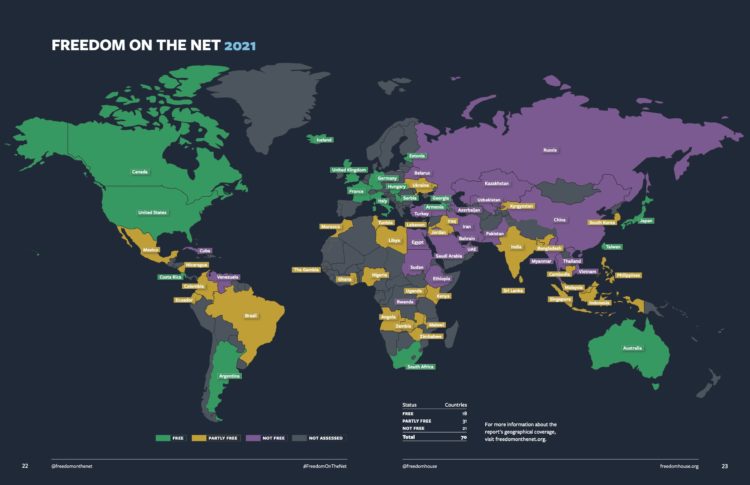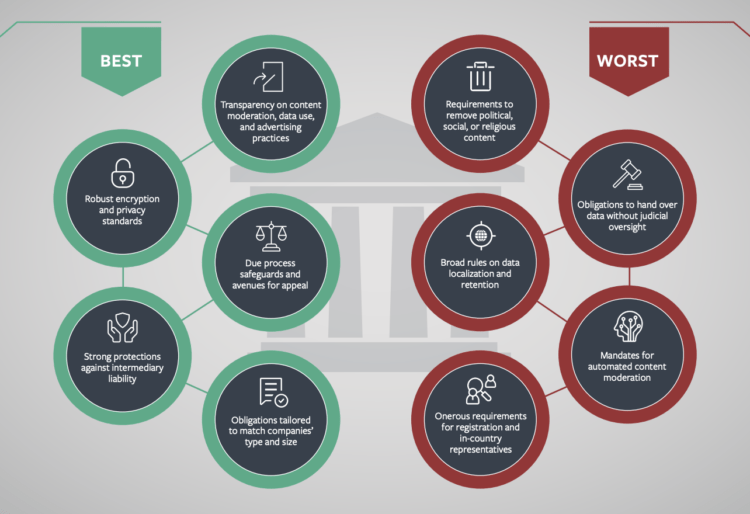
Credit: Freedom House
Global internet freedom declined for the 11th consecutive year as governments increasingly asserted authority over technology platforms and forced businesses to comply with censorship and surveillance, according to Freedom on the Net 2021, the annual country-by-country assessment of internet freedom from Freedom House:
Global norms shifted dramatically toward greater state intervention in the digital sphere over the past year. Of the 70 states covered by Freedom on the Net 2021, 48 pursued legal or administrative action against technology companies. Some measures reflected legitimate attempts to mitigate online harms, rein in misuse of data, or end manipulative market practices. Many governments, however, proposed new policies that obliged businesses to remove content and share personal data with authorities, at great cost to free expression, privacy, and public accountability.
“The daunting complexity of internet regulation makes it all the more important for democracies to take the lead and set a high bar by introducing regulatory approaches that protect human rights online and preserve a free and open internet,” said Allie Funk, senior research analyst for technology and democracy at Freedom House.
The past year saw “a record-breaking crackdown on freedom of expression online,” the report states, adding that some 75% of the global online population lives under regimes that arrest or imprison people “for posting content on political, social, or religious issues,” while 72% “live in countries where individuals have been attacked or killed for their online activities.”

Credit: Freedom House
Daphne Keller, who directs the program on platform regulation at Stanford University’s Cyber Policy Center, said what’s happening in Russia is part of a pattern of similar internet restrictions taking place around the world, including India and Turkey, NBC News adds.
“There are two stages to it. One is to pass laws requiring platforms to do some things to signify their compliance up front — before they even receive a takedown request,” she said, pointing to laws that require companies to have a local office with employees or data stored in the country. “Then there’s the separate stage of sending takedown requests using new laws that give them additional teeth and penalties they can now bring to bear.”
FREEDOM HOUSE KEY FINDINGS:
- Global internet freedom declined for the 11th consecutive year. The greatest deteriorations were documented in Myanmar, Belarus, and Uganda, where state forces cracked down amid electoral and constitutional crises.
- Governments clashed with technology companies on users’ rights. Authorities in at least 48 countries pursued new rules for tech companies on content, data, and competition over the past year. With a few positive exceptions, the push to regulate the tech industry, which stems in some cases from genuine problems like online harassment and manipulative market practices, is being exploited to subdue free expression and gain greater access to private data.
- Free expression online is under unprecedented strain. More governments arrested users for nonviolent political, social, or religious speech than ever before. Officials suspended internet access in at least 20 countries, and 21 states blocked access to social media platforms. Authorities in at least 45 countries are suspected of obtaining sophisticated spyware or data-extraction technology from private vendors.
- China ranks as the worst environment for internet freedom for the seventh year in a row. Chinese authorities imposed draconian prison terms for online dissent, independent reporting, and mundane daily communications. The COVID-19 pandemic remains one of the most heavily censored topics. Officials also cracked down on the country’s tech giants, citing their abuses related to competition and data protection, though the campaign further concentrated power in the hands of the authoritarian state.
- The United States’ score declined for the fifth consecutive year. False, misleading, and manipulated information continued to proliferate online, even affecting public acceptance of the 2020 presidential election results. The new administration took promising steps to enforce stronger protections for internet users.
- State intervention must protect human rights online and preserve an open internet. The emancipatory power of the internet depends on its egalitarian nature. To counter digital authoritarianism, democracies should ensure that regulations enable users to express themselves freely, share information across borders, and hold the powerful to account. RTWT







